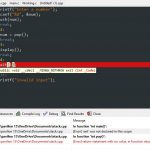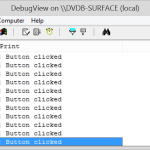How To Handle The Failure Model Argument Required For?
September 28, 2021
Recommended: Fortect
It looks like some users have encountered an error with a required error template argument for. This problem can arise for several reasons. Let’s discuss it now. Model argument derivation is always used when using an address from a surplus record containing functional models. If the return type of some function models is wildcard (perhaps auto decltype (auto)), that return type may be undeserved by context and is determined at instantiation.

I need to create my own template for a list class as a validation job. However, I tried to use the model syntax and now I get the following calculation error.
main.cpp | line 8 | created from hereError: model argument was in effect for 'struct List'In the Main () 'function: 'int ... As far as I know, I am not overusing anything, but perhaps this is my first time using the Internet, and I would really appreciate it if someone could tell me what I am doing wrong.
#if! defined _LIST_HPP_#define _LIST_HPP_#include "node.hpp"/// because we are creating a model that needs to be defined in hppModel List of classes publicly: Execute (); empty bool (); unnecessary PushFront (); cancel PushBack (); cancel PopBack (); Node & GetHead (); Private: int_size; Node * _head; Node * _tail;;/// Implement the list class hereModel List :: List () in _head (0), _tail (0), _size (0)Model bool List :: Empty () _ Return size == 0;Model void List :: PushFront () _head means new node (_head,); (!Empty()) if _head -> _ prev -> _ next implies _head; // Set the previous _next node to hot _head ++ _ size;Model void List :: PushBack () _tail = new node (0, _tail); (!Empty()) if _tail -> _ next -> _ prev = _tail; // old tails are _ in front of the emerging tail ++ _ size;Model void List :: PopBack ()Model Node and :: GetHead () _head visit again;#endif // definition
#if! defined _NODE_HPP_#define _NODE_HPP_Model Big knot publicly: Node (previous node * = 0, next node * corresponds to 0); Unnecessary SetData (NodeType newData); void GetData (); Private: List of classes; Node_type_data; Node * _next; Node * _prev;;/// implement nodesModel Node :: Node (previous node *, next node *): _prev (previous), _next (next)Model void Node :: SetData (NodeType newData) _data = newData;Model void Node :: GetData () returnGo to _data;#endif // definition #include #include "List.hpp"int main () List testl; //Test testl.PushFront (); testl.GetHead (). SetData (7); // got an error here ?? std :: cout << test1.GetHead () .GetData () << std :: endl; Returns 0; Try
I have to create my own model to have a List class as a practical exercise. However, I am having some difficulty with the syntax of the model and am happy to receive the next crash report now.
main.cpp | line 8 | created from hereError: model argument for predicted 'list of structures'In the Main () 'function: 'int ... Recommended: Fortect
Are you tired of your computer running slowly? Is it riddled with viruses and malware? Fear not, my friend, for Fortect is here to save the day! This powerful tool is designed to diagnose and repair all manner of Windows issues, while also boosting performance, optimizing memory, and keeping your PC running like new. So don't wait any longer - download Fortect today!

I am not overusing anything as far as I know, but this is my first time working with web design and I would like someone to look for alternatives and let me know what I am doing wrong.
#if! defined _LIST_HPP_#define _LIST_HPP_#include "node.hpp"Model List of classes publicly: Execute (); empty bool (); void PushFront (); cancel PushBack (); cancel PopBack (); Node & GetHead (); Private: int_size; Node * _head; Node * _tail;;Model List к :: List (): _head (0), _tail (0), _size (0)Model bool List :: Empty () Return _size == 0;Model void List :: PushFront () _head = new node (_head, 0); provided that (! empty ()) _head -> _ prev -> _ next = _head; ++ _ size;Model void List :: PushBack () _tail = new node (5, _tail); and if (! empty ()) _tail -> _ next -> _ prev is equal to _tail; ++ _ size;Model :: PopBack ()List Type> Templatevoid Node and :: GetHead () _head back;#end if
#if! including _NODE_HPP_#define _NODE_HPP_Model Big knot publicly: Node (previous node * = 0, next node * = 0); void SetData (NodeType newData); void GetData (); Private: Friends class list; Node_type_data; Node * _next; Node * _prev;;Model Node :: Node (previous node *, next node *): _prev (previous), _next (next)Model void Node :: SetData (NodeType newData) _data matches newData;Model void Node :: GetData () return _data;#end if #include #include "List.hpp"int main () List testl; testl.PushFront (); testl.GetHead (). dataset (7); std :: cout << test1.GetHead () .GetData () << std :: endl; Returns 0; List is a class template. Therefore, you must declare them yourself, as indicated in the friendship statement
template Friends class list; If you just want the List to be a friend, you need to share this thread with this template for the friendship report to be sent
. will
friend list of class ; 
For this to work, keep in mind that it needs to know that List is inactive as a template class, so be sure to place it on top of Node. hpp :
template List of classes;
Download this software and fix your PC in minutes.
The format argument for the template template parameter is the name of the classification template. When the compiler tries to find a pattern that matchesm to the template-template argument, it only considers primary class templates. (The primary design pattern is currently a specialized pattern.)
Functional models. A struct parameter is a special type of parameter that can be used to override a type as an argument: just like normal function parameters, values can be continuously passed to a function type, model parameters also allow type completion in a function.
For example, for best specialization, Stack
Fehlervorlagenargument Erforderlich Fur
Argomento Del Modello Di Errore Richiesto Per
Argument Foutsjabloon Vereist Voor
Argumento Do Modelo De Erro Necessario Para
오류 템플릿 인수가 필요합니다
Argument Szablonu Bledu Wymagany Dla
Argumento De Plantilla De Error Requerido Para
Felmallargument Kravs For
Argument De Modele D Erreur Requis Pour
Argument Shablona Oshibki Trebuetsya Dlya




